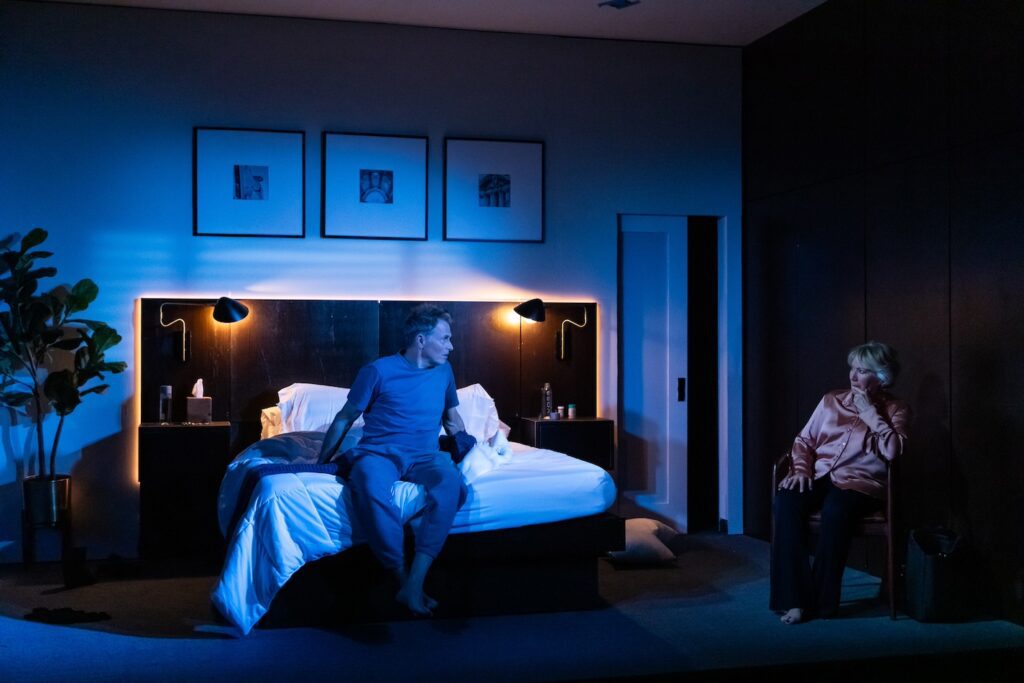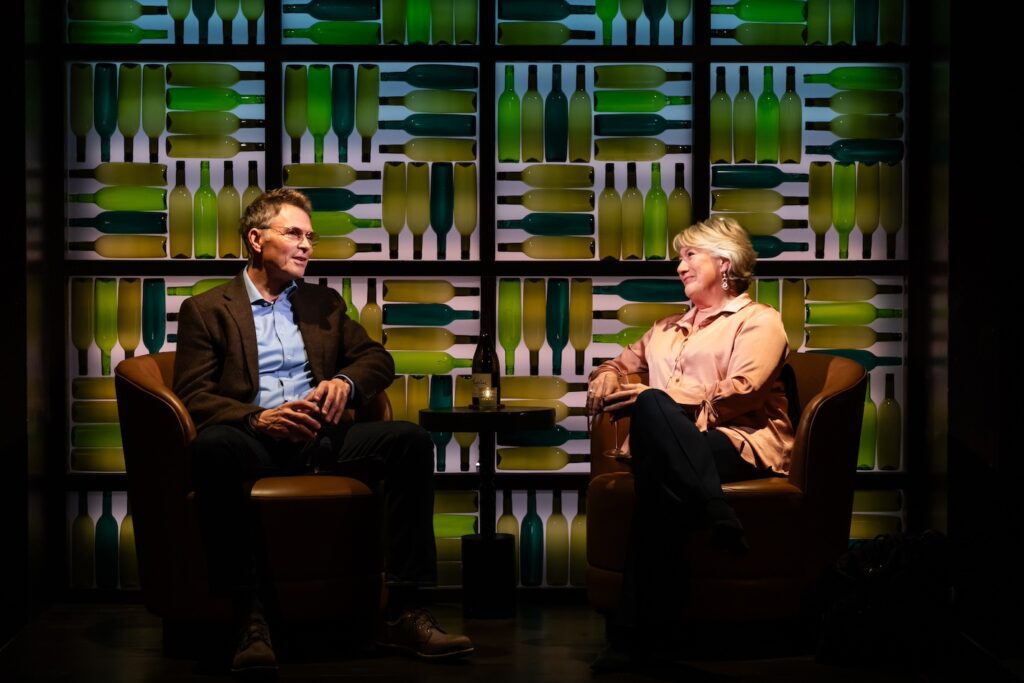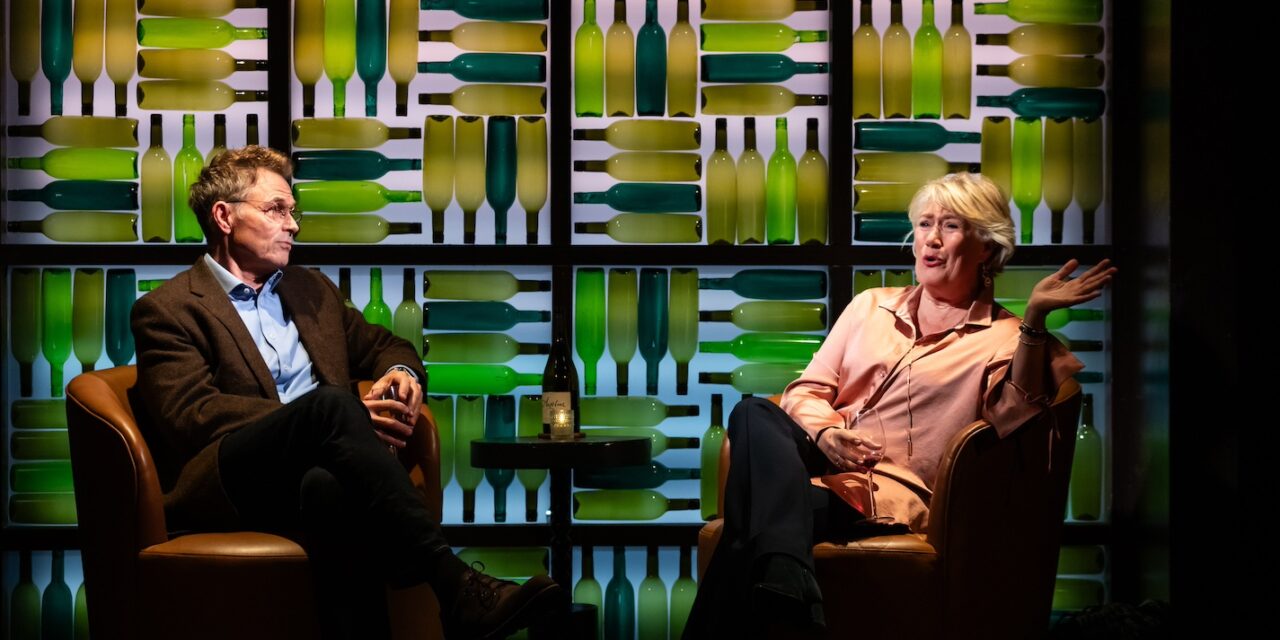Theater Review by Samuel L. Leiter . . . .
Once upon a time when romances began, the big question was: what’s the other person’s religion? Then it became a question of race. Now it’s politics. You’re a conservative. How can you love a liberal? And vice versa. Political affiliation is likely to be a game changer even when people who are strongly attracted to one another find out where the other person stands. All of which explains why this is the perfectly right time for Still, Lia Romeo’s engaging, if problematic, senior-citizen rom-com, now at Off Broadway’s DR2 Theatre after a premiere at the Dorset Theatre Festival.
Still examines the incipient romantic relationship of two political opposites—one a Democrat, the other a Republican. While it’s not an in-depth examination of a Democratic James Carville and Republican (now Libertarian) Mary Matalin linking, or even of a pair like George and Kellyanne Conway (Republicans of different stripes), it certainly brings such relationships to mind.
Playwright Romeo herself admits in a program note that the idea for the play came from her personal experience of marriage to someone she cared for but with whom she disagreed on “some important issues,” leading her to ponder, “What you do when you love someone, but you hate some of the things that person believes.”

While we await the sure-to-come play, film, or TV series that dramatizes the Conway or Carville/Matalin marriages, though, we’ll have to settle for Romeo’s enjoyable but superficial handling of a situation that allows us to ponder the viability of romance between two such politically conflicted people, especially when, age-wise, they’re past the point of no return.
Helen and Mark, a handsome, accomplished couple, are, respectively, 65 and 67, the actual ages of the handsome, accomplished actors who played them in Dorset and are doing so now: Jayne Atkinson (currently starring on Hulu’s “Death and Other Details”) and Tim Daly (fresh from Off Broadway’s Night of the Iguana). Former lovers, whose breakup each attributes to the other, they meet, at Mark’s invitation, in a hotel bar in Baltimore, where Helen appears to live.
Mark, a successful lawyer with two grown-up daughters, has flown there from Colorado Springs for what he claims are meetings in nearby Washington, D.C. Most significantly, he’s recently been divorced after 29 years of marriage. Helen is a well-known, if not particularly prolific novelist, all of whose books Mark has read. In fact, as they catch up on each other’s lives while sipping red wine and sitting on leather chairs across from a cocktail table, he shows interest—for reasons later disclosed—in how close the characters she depicts are to reality. She says, as would many writers, they’re composites of people she knows.
The casual, expository chit-chat, now and then inciting a laugh or two, reveals that Helen has a serious illness and that Mark had a relatively benign heart attack. Yet their feelings for one another still simmer; presumably this inspired the play’s odd title (not to be confused with Jen Silverman’s play of the same name about stillbirth).
Hot to trot they may be, but Helen displays mild resistance by citing her various physical drawbacks, like a few false teeth, and he does likewise, including “a spare tire,” which is not something you might detect on the impressively fit Tim Daly (as seen when he disrobes). Ironically, he exemplifies a passage in which Helen says, “Men age better than women,” even if he modestly responds, “That’s bullshit.”


Eventually, Helen accepts Mark’s invitation to join him in his hotel room, brought into view by the clever use of a revolve. Alexander Woodward’s sets, both the bar with its backlit shelves of colored bottles, and the bedroom, with its full-sized bed and dark wood side walls, make attractive use of the DR2’s small stage. Reza Behjat lights it all nicely, and Barbara A. Bell provides the appropriate costumes. Sadly, at my performance, Atkinson misbuttoned her silk blouse and I desperately wanted Daly to fix it for her.
The reason she dons her blouse is because she removed it earlier in what, given the actors’ ages, is, shall we say, a bold moment when the pair undress (within bounds) and get into bed. After the lights come up again, they’re glowing in the aftermath of a successful coupling. Things then move along swimmingly until the first of two inevitable reveals, which comes around a half hour into the 75-minute play. You may have seen it coming, but when Mark tells Helen he’s considering running for Congress it’s clear that this is where we’ve been heading all along.
If you wondered why, with all the personal baggage the couple has unloaded, politics never entered the arena, you know now, although one can argue that Helen simply assumed Mark was on the same team, the alternative being unimaginable. So the subject is simply avoided . . . until it is not. Romeo, of course, is holding back the news to make its impact more dramatic, but given what we soon learn, it’s also a strategic choice on Mark’s part, much as he’d say otherwise.
Then, of course, no sooner does Mark make his disclosure than you brace yourself for what you know is coming next, when he announces which party he’ll represent. This draws the inevitable audience response as everyone instantly leans forward, practically rubbing their hands together with anxious anticipation to see how the stunned Helen will respond. Whatever your position, it’s likely you’ll recall your own sensitivity toward the political beliefs of people who play even a minor role in your life; I’ve even found myself monitoring my conversation with my new barber from Uzbekistan via Israel.
Okay, you may want to shout to the actors as the looming conflict begins, take off the gloves and get in some good lefts and rights (politically speaking), but Romeo, while throwing a few good jabs (gay marriage gets a round), keeps the conversation mostly civil. Mark is, after all, a nice guy—a moderate, who declares (ha, ha) it’s necessary to listen to the other side. Asked whom he voted for in the last election, his answer is so wishy-washy it’s like fighters clutching each other so they don’t fall down. The playwright doesn’t want to offend too many audience members of course, so she treads carefully, although it was child’s play to recognize which side the audience favored when I attended.


But this is a play, after all, not a debate, so personal issues must prevail, such as Helen’s suspicion that their date was a setup to learn if she, as a writer, might be planning to write about a secret she and Mark have shared for over 30 years, one whose revelation might endanger his ambitions because it will expose him as a hypocrite. That secret relates to what’s perhaps the hottest issue in today’s political discourse and ignites an argument, during which the usual talking points are raised. Unfortunately, the situation comes off as a playwriting device more contrived than truthful.
The characters’ personal involvement gives the political issue a cachet beyond what mere ideological differences might inspire, but the discussion it ignites remains both emotionally and intellectually unfulfilling. The same goes for the play’s deliberately indeterminate ending: at least one frustrated audience member knows precisely what he believes (if it were real life) should have happened.
Smoothly directed for Colt Coeur by Adrienne Campbell-Holt, Still is given polished performances by its veteran stars, who provide cool, rational, camera-ready naturalism. They present well-spoken, pleasantly charming, if not especially unusual individuals made theatrically appealing by their abundant charisma. While I appreciated their conversational authenticity, Atkinson and Daly generally speak in quietly modulated tones, their words just audible enough to people down front, like me. I kept wondering, though, how much those seated further back in the long, narrow house were able to hear.
Still is a modest play with a straightforward, potentially provocative subject; it’s cleanly executed, and generally absorbing. A few minor eruptions aside, however, it lacks the passion that would raise it above the thrust and parry of its conventional exploration of progressive versus conservative ideas.
On the other hand, some compensation is to be found in its more sentimental values, especially when Helen, having calmed down after angrily throwing a ukulele at Mark (she carries a large bag filled with odds and ends), takes it up and, in a light, uncertain, but affecting way, strums as she sings Elvis’s “Can’t Help Falling In Love (Only Fools Rush In).” I doubt, however, that this touching moment should be the play’s big takeaway.
One thing’s for sure. For all its flaws, this is a play you’ll want to talk about afterward. The streetcorner postmortem I had with my companion was as lively as the show itself. If it achieves nothing else, Still will give you something to chew over, especially if—like so many—you or someone you know can relate to Mark and Helen’s problem.
Still. Through May 23 at the DR2 Theatre (103 East 15th Street, between Union Square East and Irving Place). www.darylroththeatre.com
Photos: Joey Moro


















